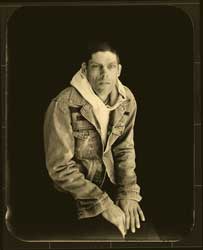Deborah Luster: The Power Of A Picture
by Claire O’Neill, npr
Photography can do powerful things. Deborah Luster, for example, tells a story of how one of her photographs reunited a family: A mother, who had spent 15 years in an Louisana prison without seeing her children, requested that Luster take her portrait — thinking that if she sent the image to her children, it might “soften their hearts.” It did. A few months later, when Luster followed up, four of the woman’s children had come to see her.

LSP40, 2000, Print of aluminium, 5x4 inches
Photography has done powerful things for Luster, too. In 1988, her mother was murdered by a contract killer. And as a way of coping, Luster found herself looking through the lens. Exactly one decade after her mother’s death, Luster was commissioned to photograph the poor parishes of northeast Louisiana, to strengthen the region’s application for federal grant money.
Wandering around, she noticed two things: there were a lot of prisons, and few people. She figured the people must be in those prisons. And so began her portrait series. Using an old-fashioned silver plate technique to emulate timelessness, she has captured thousands of inmates. Luster doesn’t ask much, doesn’t need to know the details of their stories. She just wants to show the outside world who these inmates are — as they themselves want to be seen.
Her project, titled One Big Self, comes from Terrence Malick’s film, The Thin Red Line. As the dialogue goes, “Maybe all men got one big soul where everybody’s a part of — all faces of the same man: one big self.” It’s pretty remarkable that Luster has emerged from tragedy with such a humanitarian world view. At the end of the day, she’s trying to show that although inmates may have made some big mistakes, they are people, too. That’s the power of a photograph.
